Reviews

I WANT TO believe there’s a live band at a church somewhere in the U.S. playing Joy Oladokun’s latest album, Observations From a Crowded Room. After all, Oladokun is no stranger to sanctuaries: By the time she was 16, Oladokun was leading the worship music at the charismatic nondenominational church her family attended. But around the age of 24, she quit, explaining in an interview with NPR, “I just felt like so much of my attention was going towards taking care of people and singing the right songs and not saying the wrong thing on Sunday.”
I think, for a long time, I’ve been looking for a church willing to risk singing the wrong thing on Sunday—to risk singing something like these lyrics from Oladokun’s “Dust/Divinity”: “I’m a skeptic who still prays / ... ’Cause though it hurts me to believe / It kills me not to / And I am trying to find my way through the middle / And I am desperate to receive every good thing / From now until eternity / From dust until divinity.”

AFTER MY GRANDMA died, I began to pay attention to cardinals. She loved watching birds through her kitchen windows, and the memorial cards at her funeral displayed an illustration of a cardinal. After that, every cardinal I saw felt like a message sent by my grandma from heaven, reminding me that she was looking out for me, and that she wasn’t really gone, not fully.
So, when I listened to “Cardinal,” the first track on Kacey Musgraves’ latest album Deeper Well, I felt like Musgraves wrote the song for me.
“Cardinal,” she sings, “are you bringing me a message from the other side?”
With songs about finding peace and falling in love, growing up and maturing, Deeper Well is spiritually grounding. A reminder to slow down, go outside, and appreciate what we have.
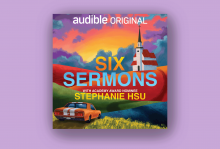
PASTOR ALEXIS (narrated by Stephanie Hsu) is a recent divinity school graduate who has been hand-selected by Pastor William Hoyt (voiced by Bill Irwin) to succeed him at Trinity Grace Church in Ohio. Alexis has been working alongside Will, learning the rhythms and rigors of pastoring a small-town church. She’s young, radical, and fearless. These qualities — the very reasons Will chose her — are exactly what make a significant and influential portion of the congregation certain she’s the wrong choice. Then Will dies by suicide. Alexis is thrust into the role of lead pastor far sooner than she expected, and in apocalyptic conditions. All this is merely the first episode of Six Sermons, a 12-episode fiction podcast written by Asa Merritt (a journalist and author of the 2015 play True Believer about the Arab Spring).
Six Sermons is the story of how Alexis navigates this intense crisis: How will the cause of Will’s death impact the congregation? What should the memorial service entail? How is Alexis caring for her own mental health in the wake of her friend and mentor’s death?
Alexis, in particular, experiences God’s absence acutely. Six Sermons powerfully illustrates the humanity of pastors; both Will and Alexis are raw, vulnerable, and flawed. Early in their mentoring relationship, Will tells Alexis, “You don’t really know God until you meet him at night.” This is a story of meeting God at night.

HOZIER IS AN artist known for using biblical, religious, and mythological allusions to make sense of the complexity of human relationships. So, it’s appropriate that he begins Unreal Unearth, his newest and third album, at the beginning. The opening track, “De Selby (Part 1),” serves as a musical preamble that recalls one of the most striking and haunting scenes in the Bible: Genesis 1. Lyrically, Hozier takes us to the very beginning, the Spirit floating, formless, above the void. In a sort of abstract for the album, he sings of “the likes of a darkness so deep / that God, at the start, couldn’t bear.” It was a depth of aloneness so “intolerable,” Hozier explains on his YouTube channel, that God “had to create the world.”
The rest of the album is structured as an epic journey that draws on biblical wellsprings for inspiration. Hozier has spoken publicly about being inspired by Dante’s Inferno. As he journeyed through the isolation and devastation of the pandemic, Hozier saw his story reflected in the 14th-century text by the Italian poet who realized the only way out of the underworld — and into the light — is through it.

INDIE-ROCKER MAGGIE Rogers says she feels her emotions in her teeth: Anger and love make her gums pulse and jaw tighten. Rogers’ second studio album, Surrender, is testament to what happens when we unclench our jaws and give our emotions room to breathe.
“This is the story of what happened when I finally gave in,” Rogers said in the trailer for Surrender. The result is a cohesive journey through the many questions that plague our grief-stricken culture. Offering both solace and space for unanswered questions, the album, released last summer, is an invitation to dance — to surrender to the coexistence of beauty and suffering in the world.

IN OCEAN VUONG'S latest collection Time Is a Mother, the T.S. Eliot Prize-winning poet reaches for depths of what was lost.
We encounter Vuong submerged in profound and compounding grief after the death of his mother. The book’s epigraph from César Vallejo reads, “Forgive me, Lord: I’ve died so little,” touching on the guilt that can accompany those left behind after a death. These poems hold the tension between looking back and moving forward, with the awareness of someone acquainted with feelings “that made death so large it was indistinguishable / from air,” as Vuong writes in “Not Even.” Those grieving search for comfort, while also examining life before loss—sometimes recognizing that grief was always present.
Time Is a Mother is full of questions that reckon with these past experiences. One of the first poems asks, “How else do we return to ourselves but to fold / The page so it points to the good part.” Other verses ask, “What if it wasn’t the crash that made us, but the debris?” and “How come the past tense is always longer?”
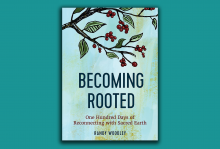
DEVOTIONALS AND OTHER daily readings can set and solidify intentions in a new year, enrich liturgical seasons, or serve as a spiritual touchpoint during hectic days. Two new books set out to root such soul work in a deepened relationship with creation. Christian theologian and scholar Randy Woodley is a Cherokee descendant recognized by the Keetoowah Band. He and his wife, Edith, an Eastern Shoshone tribal member, develop and teach sustainable Earth care based on traditional Indigenous practices in North America. Along with skill-sharing, they “hope to help others love the land on which they live.” In Becoming Rooted: One Hundred Days of Reconnecting with Sacred Earth, Woodley notes that even those of us who are not Indigenous have ancestors who likely lived somewhere for generations in community with the soil, water, plants, and animals around them.
Woodley has written 100 short daily meditations, each with a suggestion for reflection or action, to encourage all of us to “recover or discover” these values of living in harmony and balance with creation. He draws on Indigenous thought and practice, past pastoral experience, lessons from the natural world, and insightful critiques of the so-called American Dream. Through beautiful descriptions, such as how American violet seeds are dispersed by slugs and ants—“Then in the spring, another field adorns itself with food, medicine, and beauty”—and more somber reflections on the physical and spiritual toll of destructive systems, Woodley models a humble, prophetic invitation: “To accept our place as simple human beings—beings who share a world with every seen and unseen creature in this vast community of creation—is to embrace our deepest spirituality.”

ONE DOES NOT need to look hard to find a new myth forming about the great beyond. The narrative is that space travel will solve our woes—specifically the woes of racial capitalism. And this myth is appearing everywhere, in reality and fiction.
Take, for example, billionaire Richard Branson’s comments before Virgin Galactic’s suborbital mission in early July.
“Imagine a world where people of all ages, all backgrounds from anywhere, of any gender, or any ethnicity have equal access to space,” Branson told the press. “And they will in turn, I think, inspire us back here on Earth.”
Branson and fellow billionaire Jeff Bezos are in a 21st century space race, trying to justify their extreme spending to commercialize the cosmos with the idea that space travel can dissolve a litany of struggles.
The new space race is not so different from the first—the winner advances their power and reach. Between the 1950s and 1970s, the United States and the Soviet Union raced to space, then to the moon, largely for the same reason. The U.S., it might be said, won the space race by being the first to the moon (and we are still the only nation to have ever put people on the moon).
But what if things were different? This is the question explored by For All Mankind (Apple TV+), which released its second season in April. It is an exploration of a world in which the Soviets win the race to the moon, thereby extending the space race in perpetuity. The first season takes place in the ’70s, the second jumps to 1983, and the decade-jump trend will continue for all seven seasons, according to the creators.

WHEN YOU WALK into the theater, you feel you’re at an American Legion community center, with hundreds of framed male portraits lining the walls. It’s a little daunting. And then Heidi Schreck as a young woman arrives to give her speech, “What the Constitution Means to Me.”
She explains that this is how she raised her state college tuition: winning speech and debate competitions about the Constitution, taking on the male power structures that surrounded her. Our 230-year-old Constitution is a wordy and tricky document, to say the least, and Schreck steps up to it with delightful rhetoric, full presence, and comic genius. She shows us why we should be in love with it and why we should uphold it.
But then things shift, and she comes to us, blazer tossed aside, as a now-40-something woman with wisdom and deep questions. The second half of the play takes us on a whirlwind history of the document with all of its problems, especially how this male-conceived, male-written constitution suppressed and continues to suppress women. Sitting quietly at the side, and sometimes explaining the rules of the speech debate competition, is an American Legion representative, played on Broadway by Mike Iveson.
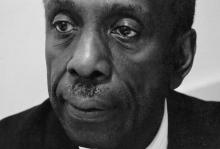
ONE OF THE MOST influential figures in the African-American civil rights movement did not march, organize, or speak at mass rallies. Mystic Howard Thurman found spiritual revelation in nature, championed the use of dance, theater, and nontraditional music in worship, and incorporated silence in his sermons. But his books, preaching, and teaching provided vital philosophical and spiritual underpinnings for the nonviolent resistance methods championed by Martin Luther King Jr. and other civil rights leaders.
Backs Against the Wall: The Howard Thurman Story, airing on PBS in February, is a documentary by Martin Doblmeier, the award-winning creator of films on faith including An American Conscience, Chaplains, and Bonhoeffer. In this rich, one-hour portrait of Thurman, civil rights leaders Jesse Jackson Sr., Rep. John Lewis, and others—as well as scholars such as Alton B. Pollard III, Walter Earl Fluker, Luther E. Smith, and Lerita Coleman Brown—offer insights on Thurman’s life, legacy, and the dynamic tension between contemplation and social justice.
The film’s title is from Thurman’s book Jesus and the Disinherited , published in 1949—said to have been carried by King and often cited by other civil rights leaders. Thurman wrote: “The masses of [people] live with their backs constantly against the wall. They are the poor, the disinherited, the dispossessed. What does our religion say to them?”
Thurman’s lifelong engagement with this question produced wisdom as vital for our day as it was for his.

SYRIAN. AMERICAN. Muslim. Woman. These distinctions of religion, geography, and gender are sometimes considered worlds of their own, but rapper Mona Haydar is used to navigating between them as a daughter of Syrian immigrants to the U.S. who grew up in Flint, Mich. Her experiences of embodying a multicultural identity in a country teeming with bigotry are the basis of her new EP, Barbarican, a collection of powerful songs that challenge rigid notions about who gets to consider themselves American and who gets left out and called a barbarian.
Haydar emerged onto the music scene in March 2017 when she released a colorful music video for her song “Hijabi (Wrap My Hijab).” The video featured her, eight months pregnant, surrounded by hijab-clad women as she rapped about diversity and the freedom to practice hijab, an often-criticized tradition in the West. Billboard named “Hijabi (Wrap My Hijab)” one of the best protest songs of 2017, creating anticipation for more music from Haydar. With Barbarican, Haydar has delivered a searing follow-up.
Opening with the line, “If they’re civilized, I’d rather stay savage,” Barbarican celebrates the colonized, specifically those who have suffered from the racist equating of “brown” and “black” to “backward” and “barbarian,” and “modern” to “white.”
In the song “Barbarian,” Haydar examines the ways in which colonialism seeps into the minds of people of color, teaching them to hate aspects of themselves. With dynamic beats and catchy refrains, she creatively subverts colonialism by using its own words against it. Haydar even fights stigma surrounding mental health, by wrestling with both her experience of postpartum depression in her song “Lifted” and her reaction to the suicide of a friend in “Suicide Doors,” which features singer-songwriter Drea d’Nur.

SEXUAL ABUSE is not about sex: It’s about power.
At least that’s what Ona, the female protagonist of Miriam Toews’ novel Women Talking, insists in the aftermath of one of the most horrifying incidents of sexual abuse in recent history. Toews’ book is based on true events: Between 2005 and 2009, more than 100 Mennonite women and girls in a remote community in Bolivia were raped at night by what they believed were demons punishing them for their sins. These attacks were perpetrated by men in the community who used modified animal anesthetics to drug and rape the women in their own homes. The victims’ ages ranged from 3 to 65.
Toews’ novel is a fictional account of a conversation between eight of these women. As Toews’ story develops, the rapists are imprisoned, other men of the community have gone to bail them out, and the women—illiterate and unaware of what lies beyond the boundaries of their community—gather to decide between three courses of action: do nothing, stay and fight, or leave. As they debate, their dialogue is infused with theological discussions and surprisingly dark humor. These conversations give insight into the community’s culture, religiosity, and the ways that each woman copes with her personal grief.
Oddly, the voice of August Epp, the meeting’s minutes taker and the only man present, dominates Toews’ narrative. This story about women resisting a patriarchy gives an unexpected amount of attention to a man.
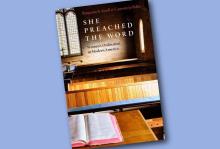
WHEN I WAS IN COLLEGE, I asked one of my faith leaders at the time why no women were in positions of authority in that ministry. He said that the male leaders’ wives were always available to serve as mentors. Besides, he added, if they hired a woman, she would just get married and quit to raise a family.
I left, I fumed, and then I read Sarah Bessey’s Jesus Feminist, which told me that not only could women serve as pastors and leaders in the church, but that Jesus wanted them to.
If that were so, I wondered, why had I encountered so few female faith leaders?
Benjamin R. Knoll and Cammie Jo Bolin have provided an answer. In She Preached the Word: Women’s Ordination in Modern America, Knoll and Bolin examine why women still make up just 15 percent of congregational clergy.
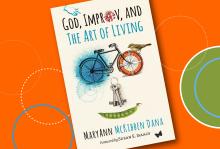
THE DAY AFTER the 2016 election, I joined my weekly improv-for-clergy workshop. We were a small group of progressive pastors still in shock. It might be more accurate to say we were still in denial. The election had given us President Donald Trump, and we wanted to scream, “No!”
Though most of us were novices, we knew the first rule of improv comedy: “Yes, and.” You accept what someone else says and build on it. Improv is impossible without “Yes.”
Our teacher asked us, “Would you rather process the election or play?” We were unanimous, albeit tepid, in choosing to play. Laughter seemed the best medicine for shared distress if midday whiskey or a four-year nap were not options. We entered the play of improv that afternoon, testing the art’s fundamental stance captured in the rule of “Yes.” How could we say “Yes” when from our core we wanted to scream “No”?
MaryAnn McKibben Dana, who participated in that group while researching God, Improv, and the Art of Living, reminds us, “We are not in control of our lives. But we can choose Yes.”
Choosing “Yes” lies at the heart of resistance, and thus the insights and practices of improv have a great deal to offer both to activism and to keeping faith through these days when affronts to human dignity and assaults on democracy come faster than laugh lines at a Second City performance.
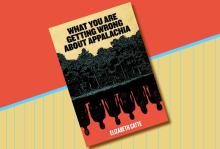
ELIZABETH CATTE'S What You Are Getting Wrong About Appalachia is the vindication every Appalachian has been craving in the wake of the media’s seemingly endless examination of so-called “Trump Country.” For any native Appalachian like me, reading this slim volume is at once a breath of fresh air and the blueprint you always wished for to respond when someone snidely expresses surprise that you have all your teeth and a good pair of shoes.
Catte divides her book into three sections. First, she provides an overview of why Appalachia is more diverse and less monolithically conservative than the media has portrayed. Second, Catte offers a direct refute to the Trump Country literary genre. The author concludes her work with a powerful description of her Appalachian home’s core values, contrasting Appalachians’ longstanding commitments to social justice and cohesive community against outsiders’ efforts to both “save” the region’s people and extract its resources without just compensation or stewardship.
Catte frankly describes her mission in writing this book as providing “critical commentary about who benefits from the omission of [diverse Appalachian] voices ... and openly celebrat[ing] the lives, actions, and legacies of those ignored in popular commentary about Appalachia.”
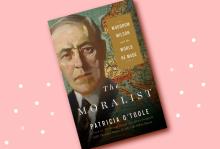
IN SPRING 1917, as the stark brutality of World War I continued into its fourth year, U.S. President Woodrow Wilson reversed his advocacy for neutrality and declared war on Germany. This controversial decision allowed a financially strapped Britain to hold out against the German onslaught.
As the war ended in November 1918, Wilson, the tight-lipped, egotistical former Princeton University president and governor of New Jersey, emerged as a great hero in Europe. “Thousands ... knelt along railway tracks to offer prayers as he passed,” writes historian Patricia O’Toole in her recently released biography, The Moralist: Woodrow Wilson and the World He Made. “Wilson ... beamed and bowed and tipped his silk hat times without number.”
Back in the U.S., Wilson was not so popular. His party, the Democrats, lost both houses of Congress. On Oct. 2, 1919, Wilson suffered a paralyzing stroke after a month of travel to build support for the Treaty of Versailles to formally end World War I.
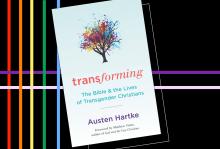
I’VE RECENTLY become acquainted with someone who is locked up in one of California’s 35 state prisons. This person also happens to identify as gay and Christian. Despite years of being told he was an abomination during his Southern Baptist upbringing, somehow my friend has managed to hold onto his love of Jesus. In one of his letters, he wrote, “I am annoyed by the attitude that says, ‘If you’re gay, it’s okay because God forgives you,’” pointing to the assumption that gayness is inherently sinful and needs to be forgiven.
This is an important intervention made by author Austen Hartke as well, as the final chapter of Transforming: The Bible and the Lives of Transgender Christians asserts the need to move “beyond apologetics” and toward theology that not only tolerates trans identity but also embraces trans people as part of the beauty and diversity of God’s creation. Moving beyond apologetics also means moving toward theologies that are written by and for trans people, listening for our unique wisdom and insights, and making changes to church policies and procedures to become more fully inclusive and loving of trans people.
Hartke has some very practical ideas for how faith communities can start doing this work, which he shares in this useful primer on trans Christianity that goes beyond “Gender & Sexuality 101.” Weaving biblical examples of gender nonconformity and transformation with the stories and voices of contemporary trans Christians, Hartke’s approach is both pastoral and prophetic as he addresses harmful Christian theology that has been used to further marginalize and exclude trans people. Hartke’s scriptural basis for a trans-affirming theology offers a healing balm for queer and trans people who have ever questioned that God loves them based on “what it says in the Bible,” while challenging progressive Christian communities to center trans perspectives in their efforts to become truly open and affirming.
Giving voice to diverse trans people reflecting on their relationships to faith, scripture, and Christian community, Hartke disavows the reader of any preconceived notion of a universal trans experience and reveals the intersections of white supremacy, capitalism, heterosexism, patriarchy, and colonialism that impact each of our lives differently, depending on our relationship to these systems of domination.
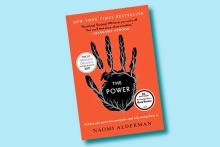
THE POWER IS THE fourth novel by Naomi Alderman, protégé of award-winning author Margaret Atwood (The Handmaid’s Tale). It centers on the discovery among the world’s women that they have a unique muscle, called a “skein,” embedded into their skin that when activated gives them an electric power that they can use to both hurt and heal.
The story is told through the narration of four protagonists—Tunde, Allie, Margot, and Roxy. Tunde is a journalist who provides the reader a global perspective on overturned social orders and flipped cultural norms through his travels. Allie gives us a glimpse into the religious order forming around women and lightning. Margot is the mayor of an undisclosed U.S. city and walks the reader through the governmental and political consequences of the power. Roxy’s involvement in organized crime affords the perspective of people leveraging a new social order for financial gain.
Alderman explores in depth the role reversals between men and women. Gender-based power structures and assumptions of the previous order do not last as more women discover the power within themselves. Alderman creates a world in which men are seen as less-than, echoing stereotypes that burden women in our world: “Men are dangerous ... Men are less intelligent, less diligent, less hard-working ... Men are more likely to suffer from diseases and they are a drain on the resources of the country.”
Does this novel depict a dystopia or a feminist utopia?

LYNN NOTTAGE wrote her sizzling new play Sweat three years ago on a commission from the Oregon Shakespeare Festival. There are moments when artists such as Nottage write at the height of their powers and seem to prophesy about the life of humanity. Certainly Arthur Miller’s Death of a Salesman or Tony Kushner’s Angels in America accomplished such prophetic feats, and it’s not a stretch to say that Nottage’s Sweat could do the same. Set in the Rust Belt of the United States, with the decline of manufacturing jobs reeling out of control, Sweat may be the timeliest play of this New York theater season, opening March 4 on Broadway, at Studio 54.
Nottage got the idea to write the play after hearing that Reading, Pa., is one of the most impoverished towns in the U.S. We witness on stage the birth of Trump’s America, rife with economic hardship in a community that is doing all it can to hang on to its identity, and losing it at every turn.
This pressing drama is set between the years 2000 and 2008, shifting back and forth in time to reveal just how the devastating economic hardships of the 21st century were taking hold. Most of the scenes are set in the town’s local watering hole, where we witness the local culture, friendships breaking down, and a serious hate crime that lands two of the characters in jail. We follow these two directionless young men who are seeking a life that yields more than just another job. We also follow a trio of female friends who have supported one another through it all on the factory floor and in the intimacies of life.

WITH THE ONGOING shattering of silence through the #MeToo movement and a record number of women running for office, 2018 feels unstoppable in its forward movement. Infused with bold rhythms, Joy Ike’s latest album, Bigger Than Your Box, could easily serve as the soundtrack of this march.
While described by Ike as a “political album that has nothing to do with politics,” Bigger Than Your Box conjures up images of self-serving leaders, complacent neighbors, and waning nostalgia. “You may want to go back where you’ve come,” Ike sings in “Say Goodbye.” “But there’s nothing for you and it’s not an option.”